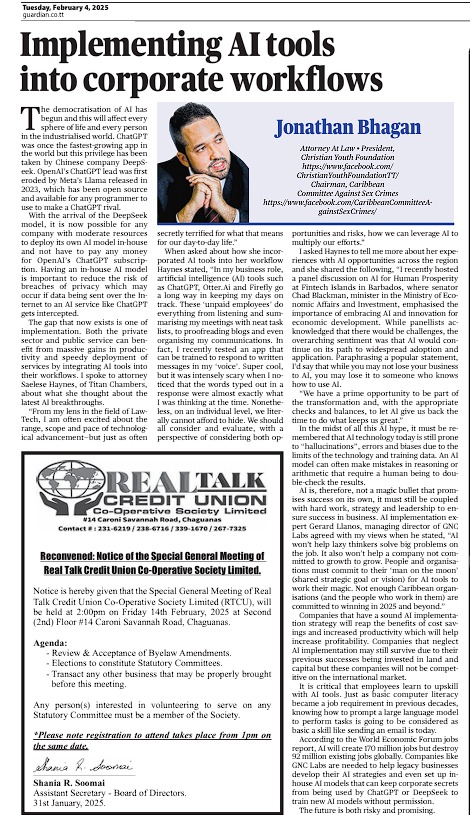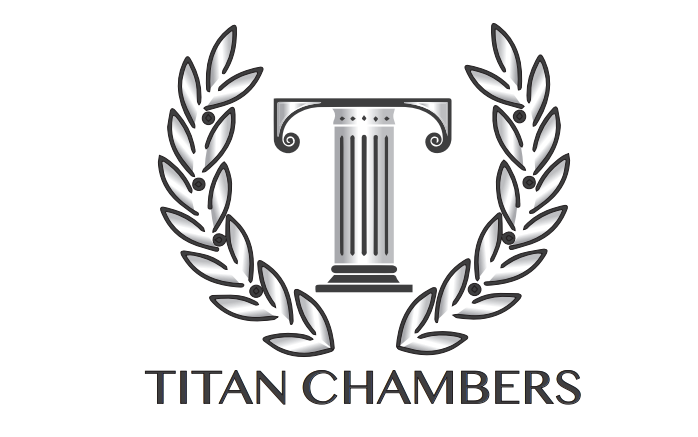The democratisation of AI has begun and this will affect every sphere of life and every person in the industrialised world. ChatGPT was once the fastest-growing app in the world but this privilege has been taken by Chinese company DeepSeek. OpenAI’s ChatGPT lead was first eroded by Meta’s Llama released in 2023 which has been open source and available for any programmer to use to make a ChatGPT rival.
With the arrival of the DeepSeek model, it is now possible for any company with moderate resources to deploy its own AI model in-house and not have to pay any money for Open AI’s ChatGPT subscription. Having an in-house AI model is important to reduce the risk of breaches of privacy which may occur if data being sent over the internet to an AI service like ChatGPT gets intercepted.
The gap that now exists is one of implementation. Both the private sector and public service can benefit from massive gains in productivity and speedy deployment of services by integrating AI tools into their workflows.
I spoke to Attorney-at-Law Saelese Haynes of Titan Chambers about what she thought about the latest AI breakthroughs.
“From my lens in the field of LawTech, I am often excited about the range, scope and pace of technological advancement – but just as often secretly terrified for what that means for our day-to-day life.”
When asked about how she incorporated AI tools into her workflow Saelese stated:
“In my business role, artificial intelligence (AI) tools such as ChatGPT, Otter.Ai and Firefly go a long way in keeping my days on track. These ‘unpaid employees’ do everything from listening and summarising my meetings with neat task lists, to proofreading blogs and even organising my communications. In fact, I recently tested an app that can be trained to respond to written messages in my ‘voice’. Super cool, but it was intensely scary when I noticed that the words typed out in a response were almost exactly what I was thinking at the time. Nonetheless, on an individual level, we literally cannot afford to hide. We should all consider and evaluate, with a perspective of considering both opportunities and risks, how we can leverage AI to multiply our efforts.”
“From my lens in the field of LawTech, I am often excited about the range, scope and pace of technological advancement – but just as often secretly terrified for what that means for our day-to-day life.”
Saelese Haynes
I asked Saelese to tell me more about her experiences with AI opportunities across the region and she shared the following: “I recently hosted a panel discussion on AI for Human Prosperity at Fintech Islands in Barbados where Senator Chad Blackman, Minister in the Ministry of Economic Affairs and Investment emphasised the importance of embracing AI and innovation for economic development. While panellists acknowledged that there would be challenges, the overarching sentiment was that AI would continue on its path to widespread adoption and application. Paraphrasing a popular statement, I’d say that while you may not lose your business to AI, you may lose it to someone who knows how to use AI.
We have a prime opportunity to be part of the transformation and, with the appropriate checks and balances, to let AI give us back the time to do what keeps us great.”
In the midst of all this AI hype, it must be remembered that AI technology today is still prone to ‘hallucinations’, errors and biases due to the limits of the technology and training data. An AI model can often make mistakes in reasoning or arithmetic that require a human being to double-check the results.
AI is therefore not a magic bullet that promises success on its own, it must still be coupled with hard work, strategy and leadership to ensure success in business. AI implementation expert Gerard Llanos, Managing Director of GNC Labs agreed with my views when he stated:
“AI won’t help lazy thinkers solve big problems on the job. It also won’t help a company not committed to growth to grow. People and organizations must commit to their “man on the moon” (Shared strategic Goal or vision) for AI tools to work their magic. Not enough Caribbean organizations (and the people who work in them) are committed to winning in 2025 and beyond.”
Companies that have a sound AI implementation strategy will reap the benefits of cost savings and increased productivity which will help increase profitability. Companies that neglect AI implementation may still survive due to their previous successes being invested in land and capital but these companies will not be competitive on the international market.
It is critical that employees learn to upskill with AI tools. Just as basic computer literacy became a job requirement in previous decades, knowing how to prompt a large language model to perform tasks is going to be considered as basic a skill like sending an email is today.
According to the World Economic Forum jobs report AI will create 170 million jobs but destroy 92 million existing jobs globally. Companies like GNC Labs are needed to help legacy businesses develop their AI strategies and even set up in-house AI models that can keep corporate secrets from being used by ChatGPT or DeepSeek to train new AI models without permission.
The future is both risky and promising.

DISCLAIMER
The information on this site is provided for general information only. It does not constitute legal or other professional advice. Unless otherwise specified, content on this site relates only to the laws of Trinidad and Tobago.
No representations or warranties are made about the suitability, currentness, comprehensiveness and/or accuracy of the information on this website. You should consult an Attorney of your choice in any legal matter that you may have. Liability for any loss or damage of any kind whatsoever as a result of utilising the information on this site is hereby excluded to the fullest extent of the law.


It is astonishing.
Invest in reliability and smooth operation of your equipment!
Stay up to date
Hey there, buddy! I’m overjoyed to run into you today.
My journey through this website reminded me of savoring gourmet dishes at an upscale restaurant in Paris, where every dish tells a story and delights the senses. The exquisite presentation and rich content reflect the essence of creativity and artistry. Thank you for the chance to share my thoughts and I hope you continue to serve up such delectable experiences.
Your site’s beauty is captivating
Auf Wiedersehen, and may your spirit be rejuvenated
Immerse yourself in the world of cutting-edge technology
Take a step into the future today—
Detty December is a magical time between December and early January when diaspora communities and tourists flock to Ghana, Nigeria and South Africa for an unforgettable experience filled with flavourful food, soulful African music and sunshine.
Beach parties, festivals and top-tier performances fuel the energy, while fashion takes center stage, with everyone dressing to impress.
Nearly two-thirds of Nigeria’s population is under 25, according to the United Nations Population Fund, making this one of the world’s youngest countries.
Internationally renowned Afrobeats performers and foreign artists make surprise appearances. DJs take to the streets, blasting powerful beats from consoles mounted atop bright yellow minibuses.
At times it’s all-consuming. Good luck getting hair salon appointments, affordable air tickets or navigating Lagos’ already notorious traffic when the party crowds are in town.
Detty December (“detty” is a playful corruption of “dirty”) is a triumphant celebration of culture, music and good vibes that has evolved in recent years during the traditional holidays influx of diaspora returnees, which heightened in 2018 when Ghana ran a launched a successful “Year of Return” campaign actively encouraging people to visit their ancestral homelands.
It’s gathered pace over the past five years, gaining an international reputation, as IJGBs (“I Just Got Backs”) and their friends arrive in batches, eager to unwind and blow off steam after the fast-paced, hard-working year they’ve had overseas.
For many in the vast Nigerian diaspora, it is a deeply personal homecoming, a chance to reconnect with their heritage, traditions and families while immersing themselves in the lively energy of Nigerian life.